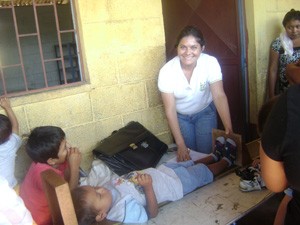
"We are bridges; we build bridges for a better future," says Gladys Marisol Soto. She is 29, a mother of two: 3-year-old Selvin David and 11-month-old Joshua. As a housewife from a rural community in Pedro Jocopilas, on the south coast of Guatemala, Gladys received a visit at her home from a USAID-sponsored community facilitator. He invited her to join a training program for mothers.
"That was one of the best decisions of my life," she said. Since Gladys has always lived in a rural community, she said, she never imagined anything more than staying at home and taking care of her family.
After a year in the training program, Gladys began to look for a job that would allow her to effectively use the newly gained knowledge while giving back to her community.
In 2010, she was recruited as a field facilitator for the USAID-supported training program. She is now responsible for six communities along the southern coast. She delivers her training - the best practices in nutrition, women's empowerment, growth monitoring - to approximately 215 women and 293 small children. Her efforts contribute greatly in a country where around half of all children under five suffer from chronic malnutrition.
This training program, in partnership with Fundazúcar, the corporate responsibility arm of the sugar industry, is part of USAID Guatemala's public-private partnerships that focus on health, nutrition and education. In under three years, the program has been able to reach over 16,000 mothers and 16,000 children under five.
"As I see myself in other mothers' eyes, I know exactly what they go through and that is the reason why I am sure we are that bridge towards a better future for our children," says Gladys. "Sometimes I start thinking that if I were not here, maybe there wouldn't be someone else who could detect those malnutrition cases and treat children on time; there wouldn't be someone to tell the mother what to do to prevent her child from getting sick!"







Comment
Make a general inquiry or suggest an improvement.